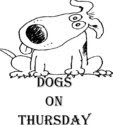I am in Month 3 of my quest to read and review 13 Canadian books about dogs over the course of a year. This month's offering is Stanley's Coren's The Intelligence of Dogs: A Guide to the Thoughts, Emotions, and Inner Livers of Our Canine Companions (and just for the record, I read the "Revised and with a New Preface by the Author" edition, published in 2006). Born in the US, Coren moved to Vancouver in 1973 to take a position with the Psychology Department at UBC. Coren is now a professor emeritus at UBC, and continues to teach, research, and publish.
I have long been a fan of Coren's, ever since discovering his program Good Dog!, which used to be on the Life Network (now Slice) in Canada. I've previously read Coren's How Your Dog Thinks; How to Speak Dog; and Why Does my Dog Act that Way? I've consciously put off reading The Intelligence of Dogs because it contains a list of dog breeds, ranked by how intelligent they are, and I am well aware that most people do not consider beagles to be very intelligent. Which I would argue about, but it is too soon in my review to digress.
I believe The Intelligence of Dogs is the first book that Coren wrote about dogs, and it is still the most controversial. Coren argues that dog intelligence is largely predetermined by breed; and that certain breeds are more intelligent than others. Coren is careful to thoroughly explain what he means by "intelligence," and that the intelligence he measures and ranks in the book are based on "working or obedience intelligence" or how quickly and easily dogs can learn the commands we use to train them.
For the record, beagles are ranked at #72 in a list that goes to #79. What does this mean for me, and other beagle guardians? Coren states that dogs with a ranking of 70-79 are the most difficult to train, and any skills they do learn may "evaporate" without practice. That said, Coren, who is active in obedience training, trials, and competition, owns - and, yes, trains - a beagle named Darby. As Coren points out, sometimes intelligence is overrated. Very smart dogs may turn out to be a handful, as they may get bored very quickly or figure out behaviours to get away with things we don't want them doing. I would argue that beagles are most adept at figuring out such behaviours . Gabe can turn a doorknob and scurry backwards to allow the door to swing towards him. Archie is a master faker, and will do things like bark up a storm as he runs towards the gate, prompting Gabe to leave a prized toy or chewie behind in his rush to find out what the ruckus is about. My foster girlie, Annie, was quite adept at hoarding prizes on her bed, and she gained her prized possessions by opening cupboard doors and laundry basket lids.
There are sections in this book that show you how to measure your dog's IQ, how to test your dog's obedience personality, and how to stretch and improve your four-legged friend's intelligence. In my rush to get at least one review posted this month, I did not have an opportunity to do the testing, but I definitely will at some point (likely in the winter when it is too cold to go outside and I am looking for some way to amuse both the boys and myself).
Overall, this is a very interesting read and I continue - four books in - to be astounded by how well Coren "translates" boring scientific detail and terminology into lay(wo)man terms. Discussion on how dogs evolved from wolves/jackals/dingoes and a look at how Descartes's opinions shaped our view of dogs for centuries could be dry reading indeed, but Coren somehow manages to make it interesting and accessible. One quibble I do have with Coren's work is that he reuses some material from book to book, so that if you've already read one book, you'll likely be able to skip part of the next book you read.

